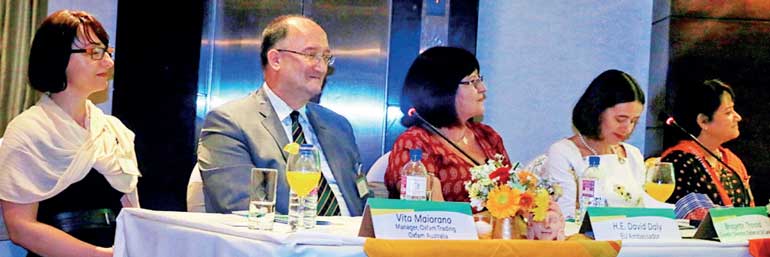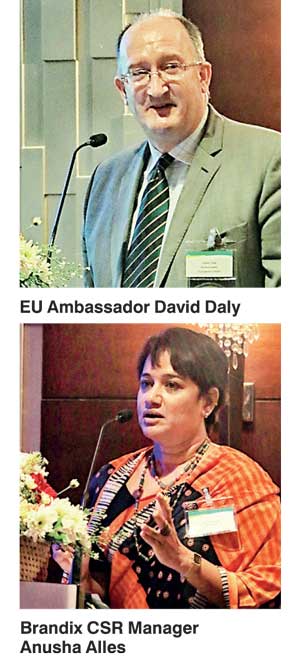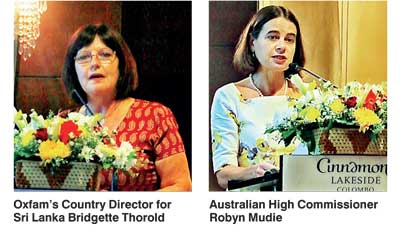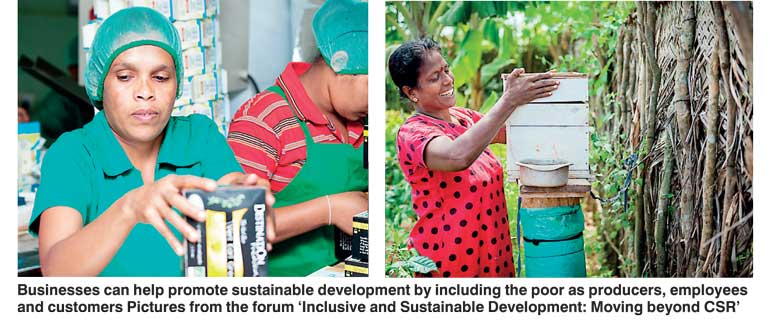Thursday Feb 26, 2026
Thursday Feb 26, 2026
Monday, 21 December 2015 00:00 - - {{hitsCtrl.values.hits}}

The head table (from left): Oxfam Trading Australia Program Manager Vita Maiorano, EU Ambassador David Daly, Oxfam Country Director for Sri Lanka Bridgette Thorold, Australian High Commissioner Robyn Mudie and Brandix CSR Manager Anusha Alles
Oxfam believes that the private sector is an essential partner in our quest for a more prosperous and safer world with equal opportunity. The Global Goals for Sustainable Development, recently launched by the United Nations, call for the private sector to be a driver in the fight against extreme poverty, inequality and climate change. The new global goals mark an opportunity for the business community and the development actors, traditionally governments and non-profit agencies, to proactively come together for a mutually beneficial agenda. The synergy proposed is one anchored in pragmatism rather than altruism, that is, a realisation that economic growth opportunity is hindered in the presence of poverty and inequity.
In its global operations, Oxfam, a co-founder of the Ethical Trading Initiative, works with the private sector, supporting them to engage productively with poor and vulnerable communities in ways that add value to businesses and drive positive social change for the poor. Oxfam helps businesses to hone their strategies, skills and competencies, so that they can form successful partnerships for sustainable development. 
“Both potential success and sustainability of the private sector’s action hinges upon the three intertwined dimensions of Inclusiveness, Sustainability and Partnerships. Corporations may ‘include’ the poor in their business models. Businesses may procure their services, products and provide them income opportunities. Alternatively, the poor may be a company’s consumers. ‘Sustainability’ calls for a value and principle based approach to devising corporate strategy, culture and practices that seek alignment between the profit motivation and global development agenda. ‘Partnerships’ create room for integrated responses, broaden knowledge bases and facilitate sharing of resources. As a global goal in itself, ‘Partnerships’ are recognised both as a means and an end for driving development,” explains Oxfam’s Country Director for Sri Lanka Bridgette Thorold.
However well-intentioned a traditional ‘donation’ based Corporate Social Responsibility approach maybe, such an investment may fail to yield the expected outcomes or contribute to the bottom-line. A well strategised approach that accounts holistically for the above multiple facets and incorporates them in the business model, however, provides a private enterprise with an opportunity to increase profitability whilst driving positive change.
Partnering with the Sri Lankan businesses
Recognising the potential of Sri Lankan private sector to incorporate inclusive and sustainable development as a key component in their core business practices, the forum ‘Inclusive and Sustainable Development: Moving beyond CSR’ brought together donors, private sector companies, social enterprises and NGOs. The event, held on 20 October in Colombo, was an initiative of Oxfam in Sri Lanka aiming to establish a dialogue between the private sector and development partners. Backed by its in-depth development know-how, presence and wide-ranging partner networks from grass-roots to global, Oxfam has been successfully mobilising ‘the power of people against poverty’ in Sri Lanka for over two decades.
Sharing the experiences from the corporate sector was Anusha Alles from Brandix. According to her, by committing to an agenda of sustainable development and targeting benefits throughout their value creation chain, businesses can make a positive difference to the lives of those who work for the company and the communities they do business in. Rather than philanthropy as a driver for CSR, this approach is underpinned by social responsibility and a genuine commitment to do right by the businesses’ most important assets – the people. 
Australian High Commissioner Robyn Mudie speaking at the event highlighted that while governments play the role of enablers of economic growth, “It is principally the private sector that creates the economic opportunities that lift people out of poverty and into formal paid employment as both business owners and as employees.” In her view, the businesses, civil society and governments must work together to achieve shared economic and social objectives.
The private sector in developing countries accounts for approximately 60 per cent of GDP, 80 per cent of capital flows and 90% of jobs. EU Ambassador David Daly highlighted the European Union’s commitment to strengthening the private sector across the developing world; “The EU provides substantial funding to support regulatory reform, capacity building, the provision of business development services and access to capital with a particular focus on micro and SME development.”
The Oxfam Global Trading network presents a total of 1500 retail outlets globally across Australasia and Europe. Oxfam Trading Program Manager Vita Maiorano highlighted the success of Oxfam Trading as one of Australia’s oldest and largest fair and ethical traders: “We use trade relationships and market facilitation as a vehicle to support poverty alleviation and promote communities to identify and overcome their challenges and define their own future.” OTA has successful trading partnerships with Sri Lankan social enterprises certified for fair and ethical trade.
